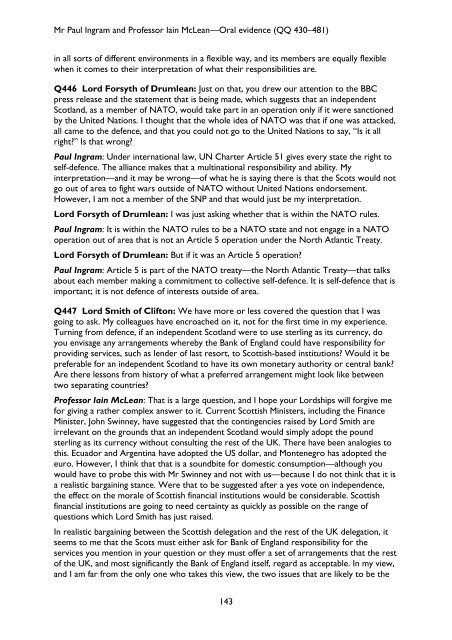SELECT COMMITTEE ON ECONOMIC AFFAIRS - Parliament
SELECT COMMITTEE ON ECONOMIC AFFAIRS - Parliament
SELECT COMMITTEE ON ECONOMIC AFFAIRS - Parliament
Create successful ePaper yourself
Turn your PDF publications into a flip-book with our unique Google optimized e-Paper software.
Mr Paul Ingram and Professor Iain McLean—Oral evidence (QQ 430–481)<br />
in all sorts of different environments in a flexible way, and its members are equally flexible<br />
when it comes to their interpretation of what their responsibilities are.<br />
Q446 Lord Forsyth of Drumlean: Just on that, you drew our attention to the BBC<br />
press release and the statement that is being made, which suggests that an independent<br />
Scotland, as a member of NATO, would take part in an operation only if it were sanctioned<br />
by the United Nations. I thought that the whole idea of NATO was that if one was attacked,<br />
all came to the defence, and that you could not go to the United Nations to say, “Is it all<br />
right?” Is that wrong?<br />
Paul Ingram: Under international law, UN Charter Article 51 gives every state the right to<br />
self-defence. The alliance makes that a multinational responsibility and ability. My<br />
interpretation—and it may be wrong—of what he is saying there is that the Scots would not<br />
go out of area to fight wars outside of NATO without United Nations endorsement.<br />
However, I am not a member of the SNP and that would just be my interpretation.<br />
Lord Forsyth of Drumlean: I was just asking whether that is within the NATO rules.<br />
Paul Ingram: It is within the NATO rules to be a NATO state and not engage in a NATO<br />
operation out of area that is not an Article 5 operation under the North Atlantic Treaty.<br />
Lord Forsyth of Drumlean: But if it was an Article 5 operation?<br />
Paul Ingram: Article 5 is part of the NATO treaty—the North Atlantic Treaty—that talks<br />
about each member making a commitment to collective self-defence. It is self-defence that is<br />
important; it is not defence of interests outside of area.<br />
Q447 Lord Smith of Clifton: We have more or less covered the question that I was<br />
going to ask. My colleagues have encroached on it, not for the first time in my experience.<br />
Turning from defence, if an independent Scotland were to use sterling as its currency, do<br />
you envisage any arrangements whereby the Bank of England could have responsibility for<br />
providing services, such as lender of last resort, to Scottish-based institutions? Would it be<br />
preferable for an independent Scotland to have its own monetary authority or central bank?<br />
Are there lessons from history of what a preferred arrangement might look like between<br />
two separating countries?<br />
Professor Iain McLean: That is a large question, and I hope your Lordships will forgive me<br />
for giving a rather complex answer to it. Current Scottish Ministers, including the Finance<br />
Minister, John Swinney, have suggested that the contingencies raised by Lord Smith are<br />
irrelevant on the grounds that an independent Scotland would simply adopt the pound<br />
sterling as its currency without consulting the rest of the UK. There have been analogies to<br />
this. Ecuador and Argentina have adopted the US dollar, and Montenegro has adopted the<br />
euro. However, I think that that is a soundbite for domestic consumption—although you<br />
would have to probe this with Mr Swinney and not with us—because I do not think that it is<br />
a realistic bargaining stance. Were that to be suggested after a yes vote on independence,<br />
the effect on the morale of Scottish financial institutions would be considerable. Scottish<br />
financial institutions are going to need certainty as quickly as possible on the range of<br />
questions which Lord Smith has just raised.<br />
In realistic bargaining between the Scottish delegation and the rest of the UK delegation, it<br />
seems to me that the Scots must either ask for Bank of England responsibility for the<br />
services you mention in your question or they must offer a set of arrangements that the rest<br />
of the UK, and most significantly the Bank of England itself, regard as acceptable. In my view,<br />
and I am far from the only one who takes this view, the two issues that are likely to be the<br />
143

















